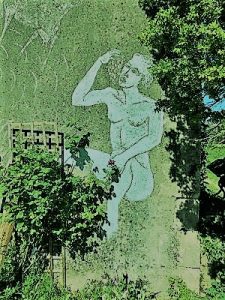Rien N’empêche D’autres Oiseaux
Ariane Dreyfus (1958)
Rien N’empêche D’autres Oiseaux
Elle s’arrête quand l’eau lui arrive à la taille
Regarde, avance à nouveau, et la mer infinie
La suit, traîne qu’elle sent à peine, la robe elle l’imagine
S’effacent ses omoplates de petite fille
À chaque fois qu’elle lève les coudes et se hausse
Car il fait froid
Mais l’eau est calme, pas embêtante
Frileux les autres sont restés derrière
C’est donc un instant de princesse
Elle baisse les yeux, mais pas la tête
À cause de sa couronne qui pourrait tomber
Regarde comment ses pieds glissent
Sur le sable
Parce qu’il est très loin les jambes ont grandi
Elles se tordent à plein de reflets
Le soleil y va, en profondeur
Et plus en profondeur la pointe des pieds
Pour aller jusqu’au sol intouché
L’eau presqu’à la poitrine, elle étire ses bras
Ainsi flottent les mains
Puis s’allonger, sinon comment voir que le ciel
Donne un si grand vertige, et les nuages en forme de personne?Nothing Prevents Other Birds
She stops when the water gets up to her waist
She looks and goes forward: the infinite sea
Follows after, a hint of a train of a dress.
Her little-girl shoulder-blades vanish effaced
Whenever she raises her elbows and torso
But it’s nice, water’s calm (and it couldn’t be more so).
All the rest stayed behind, they don’t fancy the cold
So, princess! It’s her moment. She lowers her eyes
Not her head though: her crown might fall off. She descries
How her feet glide along on the sand far below
Her legs have got longer they twist and refract,
The sun plunges down, even deeper her toes
To touch virginal ground. Water’s up to her chest:
She puts out her arms, floats her hands, as you do.
She reclines at full stretch, or how else to attest
The vertiginous sky, clouds the shape of just who?Posted on Modern Poetry in Translation website, 2017
Translation: Copyright © Timothy Adès
